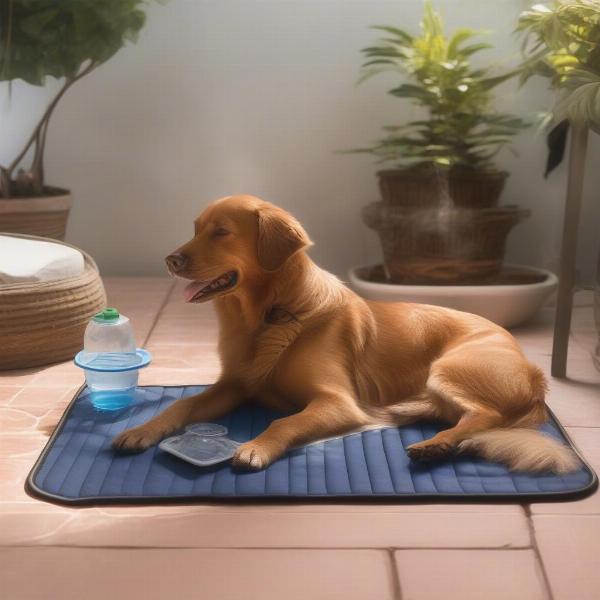The term “pops dogs” might initially seem confusing, but it likely points to a common interest: frozen treats for our canine companions. This article will delve into the world of safe and enjoyable frozen treats for dogs, offering guidance on making homemade “pops” and understanding the potential risks associated with certain ingredients and store-bought options. We’ll explore how to keep your furry friend cool and happy during those hot summer months, while also prioritizing their health and well-being.
Making Dog-Friendly “Pops”: A Refreshing Summer Treat
Creating homemade frozen treats for your dog can be a fun and rewarding experience. It allows you to control the ingredients, ensuring they are safe and healthy. Here’s a simple recipe for dog-friendly “pops”:
- Base Ingredients: Plain yogurt (unsweetened, xylitol-free), pureed fruits like banana or blueberry, or even a simple broth base.
- Optional Add-ins: Small pieces of dog-friendly fruits like apple slices or chopped carrots, or a sprinkle of dog biscuits.
- Freezing Methods: Pour the mixture into ice cube trays, silicone molds shaped like paws or bones, or even reusable popsicle molds designed for pets.
- Serving Tips: Always supervise your dog while they enjoy their frozen treat. Remove any sticks or molds that could become choking hazards.
Store-Bought Frozen Treats: Navigating the Options
While making your own “pops” is ideal, there are store-bought frozen treats available. However, it’s crucial to read the ingredients carefully. Avoid products containing artificial sweeteners like xylitol, which is toxic to dogs. Look for options made with natural ingredients and limited added sugars.
What About Regular Popsicles? A Word of Caution
While the idea of sharing your popsicle with your dog might be tempting, it’s best to avoid it. Many human popsicles contain xylitol, artificial colors, and high amounts of sugar, none of which are good for your furry friend. Even those without xylitol can still upset their stomach due to the high sugar content.
Ingredients to Avoid: Keeping Your Dog Safe
Certain ingredients are absolute no-nos when it comes to frozen treats for dogs. Xylitol, as mentioned earlier, is highly toxic and can cause liver failure. Grapes and raisins are also dangerous for dogs and should never be included in their treats. Avoid chocolate, macadamia nuts, and anything containing caffeine.
Keeping Your Dog Cool in the Summer: Beyond Frozen Treats
Frozen treats are a great way to help your dog beat the heat, but other strategies are equally important. Always provide plenty of fresh water and access to shade. Avoid strenuous exercise during the hottest parts of the day and consider using cooling mats or vests to help regulate their body temperature.
 Dog Cooling Down in the Summer
Dog Cooling Down in the Summer
Conclusion: Prioritizing Safety and Enjoyment
“Pops dogs” can be a fun and refreshing treat, as long as you prioritize your dog’s safety. By understanding the potential risks and choosing healthy ingredients, you can help your furry friend enjoy the summer months while staying cool and healthy. Remember to always supervise your dog with any treat and consult with your veterinarian if you have any concerns about their diet.
FAQ
- Can I give my dog ice cubes? While a few ice cubes are generally safe, too much ice can upset their stomach.
- What are the signs of xylitol poisoning in dogs? Symptoms include vomiting, weakness, seizures, and even liver failure. Seek immediate veterinary attention if you suspect your dog has ingested xylitol.
- Can I give my dog frozen yogurt? Plain, unsweetened, xylitol-free yogurt is safe in moderation.
- Are there any fruits I should avoid giving my dog? Grapes, raisins, and the pits of certain fruits like peaches and cherries are toxic to dogs.
- How can I tell if a store-bought frozen treat is safe for my dog? Always check the ingredients list for harmful substances like xylitol, artificial sweeteners, and high amounts of sugar.
- What should I do if my dog chokes on a frozen treat? Seek immediate veterinary care.
- Can puppies have frozen treats? Yes, but always supervise them and choose treats specifically designed for puppies.
ILM Dog is your trusted resource for expert advice on all aspects of dog care, from breed selection and health to training and nutrition. We are dedicated to providing dog owners worldwide with practical, reliable information to ensure the well-being of their beloved companions. Contact us today for personalized guidance on your dog’s unique needs. Email: [email protected], Phone: +44 20-3965-8624. ILM Dog offers expert guidance on dog nutrition, health, and training, helping you make informed decisions for your furry friend. Our team of experts is passionate about providing valuable resources and personalized support to dog owners worldwide.